
PETROLEUM CHEMISTRY
Scope & Guideline
Pioneering Insights into Petroleum Science and Technology.
Introduction
Aims and Scopes
- Catalytic Processes and Materials:
Research on various catalysts, including zeolites, metal nanoparticles, and hybrid structures, that enhance the efficiency of chemical reactions in petroleum processing. - Thermodynamic and Kinetic Studies:
Investigation of the thermodynamic behaviors, reaction kinetics, and modeling of processes such as hydrocracking, hydrogenation, and Fischer-Tropsch synthesis. - Formation and Characterization of Hydrocarbons:
Studies focusing on the molecular characterization of hydrocarbons, asphaltenes, and other petroleum components, including their stability and reactivity. - Environmental Impact and Waste Management:
Research on the environmental aspects of petroleum chemistry, including the treatment of wastewater, reduction of emissions, and recycling of petroleum by-products. - Innovative Extraction Techniques:
Exploration of advanced methods for oil extraction, including the use of nanotechnology, supercritical fluids, and microwave-assisted processes. - Biochemical and Green Chemistry Approaches:
Studies addressing the use of renewable resources and biocatalysts for the sustainable production of petroleum derivatives.
Trending and Emerging
- Artificial Intelligence and Machine Learning Applications:
There is a noticeable increase in research utilizing AI and machine learning for predictive modeling in drilling, refining, and process optimization, showcasing the integration of technology in petroleum chemistry. - Nanotechnology in Petroleum Processing:
Emerging studies focus on the use of nanomaterials and nanocatalysts to enhance catalytic processes and improve the efficiency of petroleum extraction and refining. - Sustainable and Green Chemistry Practices:
An increasing number of papers emphasize sustainable practices, such as the conversion of biomass to hydrocarbons and the use of biodegradable additives in petroleum products. - Carbon Capture and Utilization Technologies:
Research on carbon capture and utilization is gaining traction, reflecting the industry's response to climate change and the need for more environmentally friendly practices. - Advanced Materials for Oil Recovery and Processing:
There is a growing interest in developing advanced materials, such as novel catalysts and adsorbents, which enhance oil recovery methods and improve the overall efficiency of petroleum processes.
Declining or Waning
- Traditional Hydrocarbon Exploration Methods:
There appears to be a waning focus on conventional exploration techniques, as more emphasis is placed on innovative and sustainable methods for extraction and processing. - Low-Temperature Catalytic Processes:
Research on low-temperature reactions and processes is decreasing, possibly due to a shift towards high-efficiency, high-temperature catalytic methods that yield faster and more effective results. - Petroleum Refining Process Optimization:
Studies aimed at optimizing traditional refining processes are becoming less prominent, as the industry increasingly looks towards novel technologies and green chemistry solutions. - Chemical Composition Analysis of Crude Oils:
While still relevant, the detailed chemical composition analysis of crude oils has seen less emphasis, possibly due to the growing interest in broader environmental impacts and sustainability.
Similar Journals
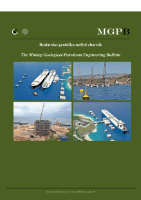
Rudarsko-Geolosko-Naftni Zbornik
Connecting Knowledge and Innovation in GeosciencesRudarsko-Geolosko-Naftni Zbornik, the esteemed journal published by the University of Zagreb's Faculty of Mining, Geology and Petroleum Engineering, serves as a vital platform for advancing knowledge in the fields of Earth sciences, energy, and geology. With an ISSN of 0353-4529 and an E-ISSN of 1849-0409, this open-access journal has been disseminating high-quality research since 1989, contributing significantly to scientific discourse in Croatia and beyond. As of 2023, it holds an impressive categorization in various quartiles, notably achieving Q2 in Earth and Planetary Sciences and Q3 in several related domains, showcasing its relevance and impact within the academic community. The journal's commitment to quality is reflected in its Scopus rankings, placing it in competitive positions across diverse disciplines. Researchers, professionals, and students alike will find invaluable resources and insights that foster innovation and collaboration in their respective fields, making Rudarsko-Geolosko-Naftni Zbornik an essential read for those dedicated to exploring the complexities of natural resources and environmental challenges.

Journal of Chemistry and Technologies
Innovative Insights for a Chemical Tomorrow.The Journal of Chemistry and Technologies, published by OLES HONCHAR DNIPROPETROVSK NATIONAL UNIVERSITY, is an open access journal dedicated to advancing knowledge in the broad fields of chemistry and chemical engineering since its inception in 2013. With ISSN 2663-2934 and E-ISSN 2663-2942, this journal provides a vital platform for researchers and professionals, particularly in Ukraine and beyond, to share innovative research findings and contemporary technological advancements. Currently ranked in the Q4 quartile in both Chemical Engineering and General Chemistry for 2023, it serves as an enriching resource for those interested in emerging trends and interdisciplinary studies within these domains. The journal adheres to high academic standards while fostering collaboration in the scientific community by offering open access articles that ensure visibility and accessibility to a global audience. As an important part of the academic landscape, the Journal of Chemistry and Technologies aims to inspire future research and development, paving the way for new discoveries and applications in chemistry-related fields.

China Petroleum Processing & Petrochemical Technology
Unveiling critical advancements in chemical engineering.China Petroleum Processing & Petrochemical Technology is a critical journal published by the China Petroleum Processing & Petrochemical Technology Press, focusing on the pivotal advancements within the field of petroleum processing and petrochemical technology. With ISSN 1008-6234, the journal has been a significant resource since its inception in 1999 and aims to disseminate original research articles, reviews, and case studies that contribute to knowledge and innovation in energy engineering, fuel technology, and chemical engineering. Despite its current Q4 status in various quartile rankings, it provides essential insights and research that are invaluable for researchers, professionals, and students interested in these expanding areas. The journal is located in Beijing, China, and continues to strive for excellence in academia, encouraging contributions that address pressing challenges in the petroleum and petrochemical industries while fostering a deeper understanding of process chemistry and technology.

CCS Chemistry
Fostering Collaboration in the Chemical Sciences CommunityCCS Chemistry, published by the esteemed Chinese Chemical Society, is a leading open-access journal dedicated to advancing the field of chemistry. Since its inception in 2019, the journal has rapidly gained recognition, achieving a remarkable impact factor that places it in the prestigious Q1 category in Chemistry (Miscellaneous) as of 2023. With a Scopus ranking of #41 out of 408 in General Chemistry, CCS Chemistry represents the top 10th percentile in its category, reflecting its commitment to high-quality research and innovation. The journal serves as a vital platform for researchers and professionals to share their findings, showcase cutting-edge methodologies, and engage with the latest developments in various chemistry subfields. Accessible to a global audience, CCS Chemistry ensures that groundbreaking research is available without barriers, making it an indispensable resource for students and academics aiming to stay at the forefront of chemical sciences. For further details, submissions, and access to published articles, please visit the journal's website.

Petroleum Exploration and Development
Bridging Knowledge and Practice in Energy ExplorationPetroleum Exploration and Development is a premier open-access journal published by KEAI PUBLISHING LTD, dedicated to advancing the fields of petroleum exploration and extraction as well as associated technologies. Since its inception in 2008, the journal has established itself as a key resource for researchers and professionals across various disciplines, evidenced by its impressive Q1 rankings in multiple categories including Economic Geology and Energy Engineering. With an impact factor that reflects its high citation rates and academic significance, this journal offers a unique platform for disseminating cutting-edge research related to geological studies, geochemistry, and energy sustainability. By making all its content freely accessible, Petroleum Exploration and Development ensures that its findings are available to a global audience, fostering collaboration and innovation within the community. Researchers, industry professionals, and students will find valuable insights and advancements in the realm of petroleum science, making it an essential part of their academic and professional libraries.
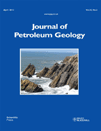
JOURNAL OF PETROLEUM GEOLOGY
Bridging Academia and Applied GeologyJOURNAL OF PETROLEUM GEOLOGY, published by WILEY, is a prestigious peer-reviewed journal that serves as a vital platform for advancing knowledge in the fields of Earth and Planetary Sciences, Energy Engineering, and Geology. Established in 1978, this journal has cultivated a significant impact, reflected in its 2023 Q2 category rankings across multiple disciplines including Fuel Technology and Geology. Notably, it holds a commendable position in Scopus rankings, marking its importance with a 68th percentile in Earth and Planetary Sciences - Geology. While the journal operates under a traditional subscription model, its extensive repository of research articles facilitates crucial discussions and innovations among researchers, professionals, and students alike. The JOURNAL OF PETROLEUM GEOLOGY is pivotal for those seeking to explore and contribute to the evolving landscape of petroleum geology, offering insights that are essential for both academic and applied science domains.
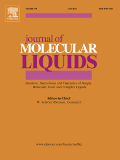
JOURNAL OF MOLECULAR LIQUIDS
Unveiling the Complexities of Liquid MoleculesJOURNAL OF MOLECULAR LIQUIDS, published by Elsevier, is a premier academic journal focused on the intricate nature of molecular liquids, spanning foundational to applied research. With an ISSN of 0167-7322 and an E-ISSN of 1873-3166, this journal has established its significance in various fields, achieving Q1 rankings across atomic and molecular physics, condensed matter physics, and materials chemistry, among others, as of 2023. The journal’s broad scope, covering studies from theoretical frameworks to experimental applications, serves as a vital platform for disseminating innovative research findings while advancing our understanding of molecular interactions and dynamics. With a strong position in Scopus rankings and high impact factors, it is a trusted resource for researchers, professionals, and students alike, seeking comprehensive insights into molecular liquids. As a journal that thrives on pioneering energy, the JOURNAL OF MOLECULAR LIQUIDS is essential for anyone wishing to remain at the forefront of research in this dynamic field.
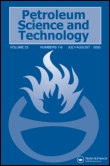
PETROLEUM SCIENCE AND TECHNOLOGY
Transforming energy challenges into engineering advancements.PETROLEUM SCIENCE AND TECHNOLOGY, published by Taylor & Francis Inc, is a pivotal journal dedicated to advancing the multidisciplinary field of petroleum engineering and related technologies. With an ISSN of 1091-6466 and an E-ISSN of 1532-2459, this journal serves as a vital platform for disseminating research in areas ranging from geotechnical engineering to energy technology. As of 2023, it is recognized in the Q3 quartile across several categories, including Chemical Engineering and Fuel Technology, signifying its respectable standing within the academic community. With a convergence timeline from 1997 to 2024, the journal continuously addresses crucial issues in the energy sector, making it essential reading for researchers, industry professionals, and policy-makers alike. Although not an open access journal, its rigorous peer-reviewed articles contribute significantly to the advancement of knowledge and innovation within these fields, reflecting the journal's commitment to promoting scientific understanding and practical applications.
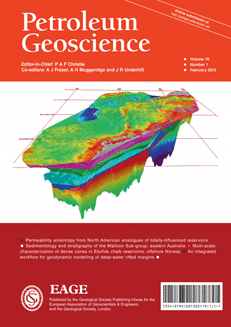
PETROLEUM GEOSCIENCE
Advancing the Frontiers of Petroleum GeosciencePETROLEUM GEOSCIENCE is a prestigious journal published by the GEOLOGICAL SOCIETY PUBLISHING HOUSE, catering to the dynamic field of geosciences with a particular focus on petroleum exploration and production. With its ISSN 1354-0793 and E-ISSN 2041-496X, this essential academic resource has been at the forefront of research since its inception in 1995, and is set to continue leading through 2024. The journal has distinguished itself with impressive rankings, achieving Q1 statuses in categories such as Earth and Planetary Sciences (miscellaneous) and Geology, and Q2 placements in Economic Geology, Fuel Technology, and Geochemistry and Petrology for the year 2023. With high recognitions in Scopus rankings, including a 79th percentile in Earth and Planetary Sciences (Geology), it is an invaluable platform for researchers and professionals seeking to share their findings and stay updated on industry advancements. Although not an open-access journal, its rigorous peer-review process ensures that published articles contribute significantly to the ongoing discourse in petroleum geosciences, fostering knowledge exchange and innovation in the field. Researchers from across the globe consider this journal a vital venue for their work, enhancing its reputation and importance in the academic landscape.

ACS Food Science & Technology
Pioneering Research for Tomorrow's Food ChallengesACS Food Science & Technology is a premier peer-reviewed journal published by the American Chemical Society (ACS) that addresses the dynamic intersections of food science, chemistry, and technology. With its E-ISSN: 2692-1944, this journal aims to disseminate innovative research and comprehensive reviews that enhance understanding in fields such as analytical chemistry, organic chemistry, and general food science. Despite the absence of an Open Access model, its position in the Q2 quartile for multiple categories in 2023 underscores its significant impact on the scholarly landscape, ensuring researchers can access high-quality research pertinent to today's food challenges. With an expanding timeline of 2021 to 2024, ACS Food Science & Technology is poised to be an essential resource for advancing the scientific community's knowledge, fostering collaboration, and bridging gaps between academia and industry.